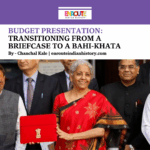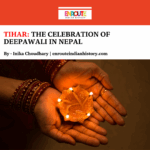Interfaith Harmony in India: Reciprocal Acts of Communal Support through Food during Religious Observances
- iamanoushkajain
- May 8, 2025

By Vaibhavi Danwar
Interfaith cooperation has always been a vital part of India’s cultural and social fabric. While history has seen its share of challenges, there have also been countless moments of unity, especially during religious celebrations. It’s heartwarming to see Hindus helping with Iftar meals during Ramadan, just as Muslims extend their support to Hindu pilgrims during events like the Kumbh Mela. These gestures go beyond mere tradition, they reflect a deep-rooted sense of shared humanity and mutual respect. Given India’s incredible religious diversity, interactions between communities are both inevitable and enriching. One of the most beautiful expressions of this harmony is the simple act of sharing food during religious occasions, reinforcing the idea that, at the core, people are bound together by kindness and solidarity.
History of indian interfaith harmony
India has been the birthplace of several major religions, including Hinduism, Buddhism, Jainism, and Sikhism, alongside numerous tribal traditions, some of which follow pantheistic beliefs. Over the centuries, religions such as Judaism, Zoroastrianism (Parsīs in India), Christianity, and Islam also found refuge and flourished in the country. In ancient India, people of different faiths coexisted peacefully under local rulers. While Islam had made its way into southern India by the 7th century, religious tensions became more pronounced with its introduction in northern India in the 12th century. Over time, Islam became deeply intertwined with India’s social fabric. From the 13th to the 19th century, India was predominantly governed by the Mughals, even though the majority of the population, particularly Hindus, remained non-Muslim. However, the country’s relatively stable religious history took a dramatic turn in 1947 with the partition of India and Pakistan. Throughout history, different religious groups have sought cultural influence and political power, yet they managed to establish their own spaces within Indian society. Whether meaningful interfaith dialogue ever truly took place remains a subject of debate.
The Indian Constitution upholds the principles of sovereignty, secularism, democracy, and republicanism, ensuring the protection of the country’s religious and cultural diversity. This unique “Unity in Diversity” remains a defining strength of India, but in today’s challenging times, it needs to be further reinforced. Encouraging interfaith dialogue could serve as a viable approach to fostering peace, harmony, and stability in the nation.
Hindus Serving Iftar Meals to Muslims
In the heart of Chennai, Tamil Nadu, a beautiful tradition of interfaith harmony has been thriving for over forty years. The Sufidar Trust, founded by Dada Ratanchand, a Hindu refugee from Sindh, has been hosting Iftar meals for Muslims during Ramadan, an act of kindness that transcends religious boundaries and embodies the spirit of unity.Each evening during the holy month, volunteers gather at a temple on Dr. Radhakrishnan Road in Mylapore to prepare food with care and devotion. The meals are then served to nearly 1,200 people at the historic Walajah Big Mosque. In a heartfelt gesture of respect, volunteers, including children, wear skull caps as they hand out plates filled with fried rice, vegetable pickles, bananas, dates, nuts, biscuits, kesar milk, and water.
The philosophy of the trust is simple: “All gods are one.” But here, in this moment, in this city that hums with so many histories and voices, it feels like more than just words. It feels like an ancient truth made tangible, a lesson passed down through generations in the language of love and selflessness. It is present in the way an elderly Muslim man, his hands trembling with age, raises his palms in gratitude toward the young Hindu boy serving him. It is in the laughter of children who do not yet know division, only the joy of receiving a meal from a stranger who feels like a friend. It is in the quiet nods exchanged between the volunteers and the fasting men and women, a silent acknowledgment that kindness does not need words.
Muslims Sheltering Hindu Devotees at Kumbh Mela
In the sacred city of Prayagraj, where faith converges at the confluence of rivers, a different kind of devotion unfolded during the Maha Kumbh Mela of 2025. As millions gathered for the spiritual pilgrimage, tragedy struck in the form of a devastating stampede on the night of January 28-29, throwing the grand event into disarray. Amidst the chaos, with thousands left stranded in the biting cold, an extraordinary act of human kindness emerged—one that transcended religious boundaries and reaffirmed the deep-rooted spirit of unity. The Muslim residents of Prayagraj, moved by compassion and an unwavering sense of shared humanity, opened their doors, literally and figuratively, to the distressed Hindu pilgrims. Mosques, mazars, dargahs, and imambaras, usually spaces of Islamic prayer and reflection, transformed overnight into sanctuaries for those in need. Homes, too, became places of refuge, where weary devotees were welcomed with open arms, regardless of faith or background.
Community kitchens sprang to life, where warm meals were prepared and shared, embodying the age-old Indian tradition of “Atithi Devo Bhava” the guest is akin to God. Blankets were handed out to shield the vulnerable from the harsh winter, and medical aid was swiftly arranged for the injured and ill. In these moments, it was not religion that mattered, but the innate kindness that binds people together in times of crisis. This was more than an act of generosity, it was a reaffirmation of something sacred, something beyond religion, beyond history, beyond politics. It was the undeniable truth that faith, in its purest form, is not about the walls we build but about the bridges we cross. That the hands which lift the fallen and the hearts that shelter the lost belong to the divine, no matter the name by which we call Him. And so, in the heart of a city steeped in centuries of devotion, a different kind of pilgrimage took place, not one towards the river, but towards each other.
The Significance of Prasad and Food in Indian Religious Practices
In India, food is not merely sustenance; it carries deep spiritual significance, woven into the fabric of religious devotion. The concept of prasad, food first offered to deities and then shared among devotees, is at the heart of Hindu worship, symbolizing both divine grace and communal unity. Likewise, in Islam, the act of breaking fast during Iftar is more than just a meal, it is a moment of togetherness, a reaffirmation of faith and brotherhood. The beauty of India’s interfaith traditions shines through in simple yet profound gestures: Hindus preparing Iftar feasts for their Muslim friends and Muslims ensuring sustenance for Hindu pilgrims during festivals. These acts are more than kindness; they reflect a shared reverence for food as a vessel of connection, love, and devotion
These expressions of solidarity are not just rare moments of goodwill but part of a long-standing tradition of communal support in India. Take, for instance, the Kumbh Mela, where spiritual devotion meets large-scale humanitarian efforts. Organizations like ISKCON, in collaboration with Akshaya Patra, ensure that no pilgrim goes hungry, serving free prasad to thousands every day. In the upcoming 2025 Maha Kumbh, ISKCON has pledged to provide meals for 40,000 individuals daily, a testament to the enduring spirit of service that transcends religious boundaries. Such acts of generosity are not mere rituals; they are reminders of the unspoken understanding that food, in its essence, is sacred. It nourishes not just the body but also the bonds between people, reinforcing the idea that faith, in all its forms, is meant to unite rather than divide.
India’s rich history of interfaith harmony, reflected in these profound acts of kindness, serves as a testament to the country’s enduring spirit of unity. From Hindus serving Iftar meals to Muslims offering shelter and sustenance to Hindu pilgrims, these gestures highlight the deep-seated culture of mutual respect and solidarity that transcends religious differences. In a world often marked by division, such traditions remind us that humanity is the ultimate bridge between faiths. Strengthening this ethos through dialogue and continued acts of service can help foster a society where peace and understanding prevail, ensuring that India’s legacy of unity in diversity remains unshaken for generations to come.
References
(Islam NU, 2023) Interfaith dialogue in India: Its need and challenges, Journal of Language, Literature, Social, and Cultural Studies, Volume 1 Number 3 (Nov 2023), p. 191-197
Times of India, ‘Here, Hindus have been serving Iftar meals to Muslims for 40 years during Ramzan’, Times of India, 17 March 2024,
TV9 Hindi, ‘Prayagraj: Muslims helping Hindu devotees in Mahakumbh, mosques opened, arrangements ranging from blankets to medicines’, TV9 Hindi, 28 January 2025,
Live Hindustan, ‘ISKCON to distribute free prasad for 40,000 daily at Kumbh Mela’, Live Hindustan, 26 February 2025



















